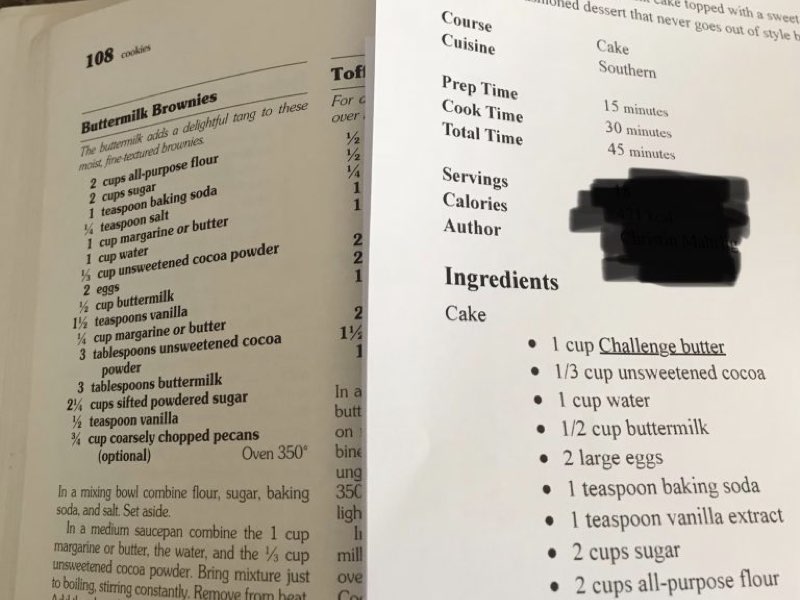The lack of copyright protection for recipes is why places like KFC have secret ingredients. It’s not because they are trying to create sensationalism. It’s because they know the minute their recipe is out, John Smith can now legally re-create their chicken.
Did you know that you can’t copyright recipes? Placing the copyright symbol on the recipe is of no help. Ingredients and their basic instructions are facts and not creations by law. In fact, it is arguable every recipe is a building block off of the original works of someone else. After all, a good recipe is based on science.
What is protected? Text surrounding the recipes and photos I may take during the process of making a recipe. For instance, if I go into a flowery description of the baking process, I can copyright that descriptive.
Let’s differentiate. Cream the butter until it looks like pillows of clouds, sprinkle in the sugar as if you are gingerly spreading carrot seeds into a fresh piece of fine soil as you hum your favorite melody. This is a unique description by the author, and can have copyright protection.
In comparison, let’s look at this description. Sift dry ingredients, cream together butter and sugar, add eggs and combine wet with dry, bake for 10 – 12 minutes. Being factual, this description is fair game and can be posted everywhere without any regard to the original author. So that secret recipe of your great grandma’s oatmeal cookies? Don’t post it anywhere if you want it to remain a secret!
So knowing this, why do some online today feel the need to steal other’s recipes? Why do they rearrange the ingredients, change a title and claim for them to be their own? Do they not feel a twinge of guilt as they steal and place the ingredients in a haphazard order? (By the way, ingredients are in order by the greatest to the smallest quantity for each section of a recipe. So a red flag is when you see ingredients not in a list from largest to smallest quantities.)
Most of the recipes listed on this website are simply from the basic knowledge of how baking works. One part sugar, two parts fat, three parts flour ratio for cookies. Equal parts of fat, sugar, eggs, and flour for cakes is a common sponge cake from centuries ago. Using a hydration ratio between 50 – 60% bread baking is also common practice. By understanding these three basic formulas, you can create recipes all day long. No more need to steal other’s works.
However, most bakers fail to learn the science behind recipes so they are unable to create their own. For instance, most recipes have precise measurements by weight. Trying to modify an arbitrary volume cup measurement is risky. You may measure 150 grams one day and 100 the next. This can depend on humidity, leveling, sifting, type of flour used, etc. This is why so many bakers fail at more than simple modifications. It is also one of the reasons bloggers resort to ripping off other’s works. The number one reason? Money. No recipe, no income.
By now, you’ve noticed the photo featured. This is a cookbook I own and a printout of a very popular blogger. She has take this and other recipes from the The Better Homes and Garden Cookbook and claims authorship. This is a widely popular cookbook. You can get various volumes of this cookbook for as little as $3 online. My mom’s is from the 70s, my husband’s, a gift by his grandmother, is from the 90s. I actually highly recommend this cookbook for beginners and the expert home baker as they are consistent and concise. If there is a recipe I want to try, this is the book I go to over any source online. Simply because I know the recipe will be great for the novice and it will taste good.
In this day and age where people feel pressured to produce at a quicker pace, it’s easy to cave. Likewise, you all now know why my recipes take much longer to post. I always share where the idea comes from and that takes time. Anyone can open up a cookbook or go to another person’s site, rearrange ingredients and flip the title. It takes guts to admit you aren’t the only source for recipes. Take your time to develop your own based on the common knowledge shared in baking. You aren’t the only baker and that’s okay.

0 Comments